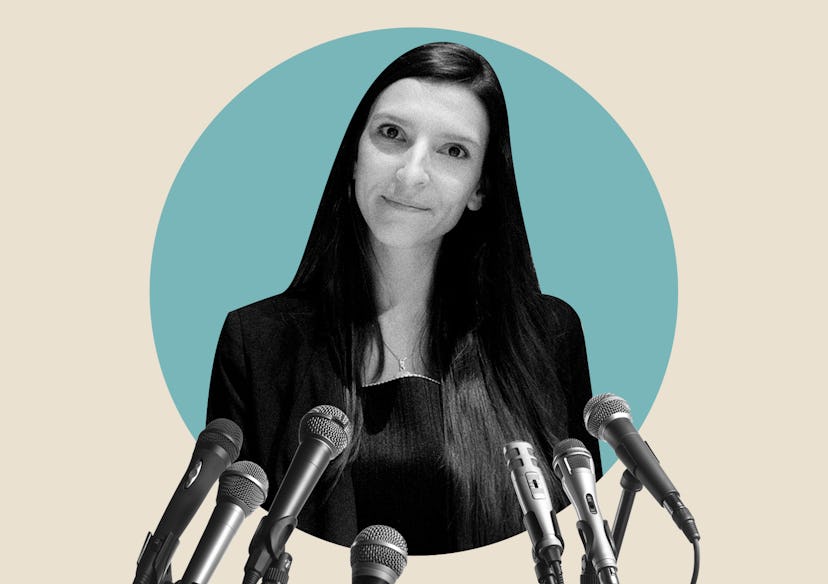The New Pioneers
Dyson Engineer Sandra Lup Reveals How She Designs The Hair Tools You're So Obsessed With
Plus, her advice for trusting your skills is a game-changer.

In Bustle's Quick Question, we ask women leaders all about advice — from the best guidance they've ever gotten to what they're still figuring out. Here, Sandra Lup, Dyson's lead design engineer, tells Bustle how she found her confidence and the importance of mentorship in science, technology, engineering, and math (STEM) fields.
In March, Dyson's lead design engineer Sandra Lup was gearing up for the launch of Dyson Corrale, a $499 low-heat flat iron that works on all hair textures. Then the pandemic hit. "We didn’t have access to our labs, so we compensated by being creative," Lup tells Bustle. "We built prototypes in our kitchens, posting and reviewing them together [via video chat]."
The process of designing a new product involves a good deal of research — and time. For the Dyson Corrale, which uses flexing plates instead of solid plates to keep your hair in place, it took the team seven years, five of which Lup was involved in. After hearing feedback from users around frustrations with straighteners on the market and looking at the scientific relationship between heat and tension, engineers were able to start creating. "We design, we build, we test, and we start all over again — we do that for a while," Lup says. The straightener's heater sub-assembly took Lup two years alone to design. The heater sub-assembly refers to the flexing plates, as well as the components located under the plates that work together to style the hair.
But problem-solving is what drew the Romanian-born engineer into her career path about seven years ago. "The fact that STEM seems difficult or challenging can sometimes prevent people from pursuing it, but the constant change in technologies, materials, and even beauty trends is the exciting part," says Lup, who now lives in London.
Below, Lup shares how she knows when a product is ready to launch, her favorite way to unwind at home, and her advice for young women carving out their paths in STEM fields.
How do you know when a product is ready for the masses?
SL: We have a rigorous way of testing our products from performance, robustness, and safety points of view, to make sure it's up to our standards. We go to our consumers all over the world and conduct numerous trials and user studies with prototypes, and later again with a nearly finished machine. We try to cover as much diversity as possible with hair types. If all goes well in the lab, we're satisfied, and if the consumers are satisfied, then we know it's ready.
Do you get nervous when a product launches?
SL: Yes! I stay up late and read the reviews. Because we spend so long developing these products, we want them to be amazing and we want people to be happy. It makes it all worth it when you read positive reviews.
What's your favorite way to recharge?
SL: I have a 3-year-old daughter at home, so I don't have much free time, but I practice meditation and enjoy nature walks and hikes on the weekends. I find that if I take a step back and relax, I can come up with a solution to a problem when I return to work on Monday.
Be confident. Know your weaknesses, but trust your skills more and show that you trust your skills because if you appear confident, then the people around you will have confidence in your work as well.
What’s the best career advice you've ever received?
SL: Be confident. Know your weaknesses, but trust your skills more and show that you trust your skills — because if you appear confident, then the people around you will have confidence in your work as well. My confidence slowly grew by doing my work well and getting positive feedback. It’s not a must, but it helps to have people tell you that you're doing a good job along the way.
What’s your advice to women in STEM fields?
SL: Be inquisitive, step outside your comfort zone, and find good role models. Most of the women in my family work in STEM, including my mother, so I would advise young women to seek out female mentors, but any mentor is a great mentor regardless of gender as long as they’re of depth and their work inspires you. There'll always be a bit of unconscious bias unfortunately, but I think women who choose STEM are brave enough to not get discouraged. Women have to be confident in the fact that they’re good at STEM and they can be just as good as a man, if not better.
This interview has been edited for length and clarity.